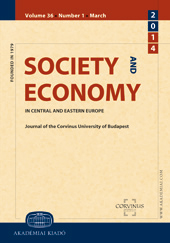The European Union’s failed “Lisbon strategy”
The European Union’s failed “Lisbon strategy”
Author(s): Arno TauschSubject(s): Economy, Government/Political systems, International relations/trade, EU-Accession / EU-DEvelopment, Fiscal Politics / Budgeting
Published by: Akadémiai Kiadó
Keywords: social spending; creative destruction; spatial models;
Summary/Abstract: Is Europe becoming the world’s leading knowledge-based economic area of the world, as European leaders planned at their Lisbon meeting in 2000? In this article, we analyze the Lisbon performance of the countries of the European Union from a long-term, structural perspective. We examine performance in the Lisbon indicators by factor analytical means. To measure progress, we observe contradictions between some of the indicators, chosen by the member governments and the European Commission. Finally, we conclude that only a Schumpeterian vision of capitalism as a process of “creative destruction,” or rather “destructive creation,” can explain these contradictions, which we empirically reveal in this analysis, and which beset the “Lisbon strategy” from the very beginning. European decision-makers often seem to be unaware of these underlying contradictions, which is why the goal of our paper is to clarify the processes involved. In Schumpeter’s elitist-conservative visions of society, the decay of values in the capitalist society was an all-important element in his pessimistic theory developed in “Capitalism, Socialism, and Democracy”. For Schumpeter the disappearance of the enterprising, male-dominated capitalist family was a critical element in his theory. But it is not the disappearance of the enterprising capitalist family that threatens the future of capitalism in Europe, but the often still existing incompatibility of work and family life, which explains more than 60% of the Lisbon process failure.
Journal: Society and Economy. In Central and Eastern Europe ǀ Journal of the Corvinus University of Budapest
- Issue Year: 32/2010
- Issue No: 1
- Page Range: 103-121
- Page Count: 19
- Language: English

